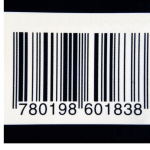Barcodes are an indispensable tool in today’s fast-paced business world. Creating unique barcodes enable efficient tracking, inventory management, and accurate data capture across various industries.
As humans, we are always looking for ways to improve our lives and what we do, and barcode technology has offered that. Business owners, logistics companies, event managers and other professionals have found barcodes to be of significant benefit to their activities.
You’ll find out in this article the meaning of a barcode, its benefits and how to create one for your product.
Table of Contents
What is a Barcode?
Barcodes are machine-readable codes scanned by barcode readers to quickly and easily identify items. A barcode generator is an invaluable tool that allows users to create unique barcodes for various purposes. These tools are typically available as software applications or online platforms.
Barcode generators generate barcode images by converting alphanumeric data into a pattern of parallel lines, dots, or squares that can be scanned and interpreted by barcode scanners or smartphone applications.
Applications of Barcode Technology
Barcodes find application in various aspects of life and business, some of which includes the following;
-
Retail and point of sale
Barcodes are extensively used in retail environments for product identification, price labelling, and inventory management. By generating unique barcodes for each product, retailers can easily track and manage their inventory. At the point of sale, barcodes enable quick and accurate scanning, facilitating faster checkout processes.
Read also: Effects of Online Food Retailing in Nigeria.
-
Logistics and supply chain management
Barcode generators help track goods throughout the supply chain in logistics and supply chain management. Barcoded labels are attached to packages, pallets, or containers, allowing for automated scanning and tracking of shipments. This streamlines processes such as receiving, sorting, warehousing, and distribution.
-
Healthcare and pharmaceuticals
Barcode technology has revolutionized the healthcare industry by enhancing patient safety and medication management. Barcoded wristbands enable accurate patient identification, reducing the risk of errors. Medication packages can also be labelled with barcodes, ensuring proper administration and tracking of drugs.
-
Document and asset management
Barcode generators are employed for efficient document and asset management. They can be printed on documents, such as invoices or receipts, for easy indexing and retrieval. Similarly, assets like equipment or tools can be labelled with barcodes for inventory tracking and maintenance scheduling.
Read also: Component and Types of Database management system.
-
Event management and ticketing
Barcodes are commonly used in event management for ticketing and access control. Barcoded tickets can be scanned at entry points, ensuring secure and convenient admission. This technology also allows event organizers to track attendance and monitor capacity.
Join our Whatsapp Community to access opportunities and resources to aid your business or career growth.
Benefits of Using Barcodes
-
Saves cost
Using barcodes contributes to cost savings by streamlining processes and reducing labour expenses. Automated barcode scanning reduces the need for manual data entry, eliminating errors associated with human input. Additionally, barcode systems minimize the risk of lost or misplaced items, reducing replacement costs.
-
Reduces risk of errors
Typing a series of letters and numbers manually into a computer exposes your business to possible mistakes. Whenever you need to process a customer’s transaction, track a package, or record inventory, there is a chance of pressing the wrong key on the keyboard.
With manual data entry, an average person makes one error per 300 characters. In contrast, barcode scanners have an accuracy rate of one error per 36 trillion characters. Can your business afford to take such risks?
-
Saves time
Data entry is a slow process, especially compared to a computer’s speed. While the time difference may seem insignificant for small tasks, it accumulates over hours or even pay periods, resulting in significant time wastage that could be better utilized.
This time factor is equally essential for your customers. Manually inputting products during checkout consumes their valuable time as well. Is investing their time worth it?
-
Improves decision-making
Barcode generators generate valuable data that can be analyzed to gain insights and make informed decisions. By tracking product movement, sales, and customer preferences, businesses can identify trends, optimize their supply chain, and plan marketing strategies more effectively. This data-driven approach enhances competitiveness and enables enterprises to stay ahead in the market.
-
Traceability and security
Barcodes enhance traceability and security across various industries. In sectors like food and pharmaceuticals, barcodes help track products from their origin to the end consumer, ensuring safety and compliance. They enable recalls, expiry date monitoring, and authentication, safeguarding consumers from counterfeit or expired goods.
-
Increases efficiency
Barcode generators automate creating barcodes, eliminating the need for manual data entry. This saves time, reduces the potential for human error, and improves decision-making. All of these increase the efficiency of a business leading to more output.
Read also: How to Set Up a Facebook Business Account.
How to Create a Barcode for Your Product
Generating a barcode is a straightforward process, especially with the help of barcode generators. Follow these steps to create your barcode:
- Determine the type of barcode you need
Depending on the industry and application, different barcode formats, such as UPC-A, Code 128, or ISBN, may be required.
- Select a barcode generator
Choose a reliable online barcode generator that supports the desired barcode format.
- Enter the relevant data
Input the required information, such as product codes, prices, or unique identifiers.
- Customize the barcode
Some barcode generators allow users to customize the appearance of the barcode, such as adding a logo or changing the colours.
- Generate and download
Click the “Generate” button to create the barcode image. Download and save it in the desired format (PNG, JPEG, SVG) for future use.
Barcode Scanners
In conjunction with barcode generators, barcode scanners play a vital role in decoding and interpreting barcode information. Barcode scanners use light-sensitive sensors to read the barcode’s pattern and convert it into alphanumeric data.
With technological advancements, smartphones with barcode scanning applications can also serve as portable scanners. Many online platforms offer barcode scanner services, enabling businesses to quickly scan barcodes, retrieve product details, and track inventory in real time.
By leveraging barcode technology, businesses can streamline operations, reduce errors, enhance customer satisfaction, and make data-driven decisions.
Conclusion
From retail to healthcare, logistics to event management, barcode generators are pivotal in ensuring smooth processes, cost savings, and improved efficiency. As technology advances, barcodes will likely evolve to meet the changing needs of businesses and consumers, contributing to a more interconnected and efficient global marketplace.
Oluwanifemi Akintomide edited this piece.
For more insightful posts like this, subscribe to our newsletter.
About Author
- Creative writer, Content creator, personal developer, health advocate.
Latest entries
 CareerNovember 26, 2023Teaching Profession in Nigeria: The Good, The Bad, and The Ugly
CareerNovember 26, 2023Teaching Profession in Nigeria: The Good, The Bad, and The Ugly WomenSeptember 21, 2023Financial Planning For Nigerian Women: Building Wealth and Security
WomenSeptember 21, 2023Financial Planning For Nigerian Women: Building Wealth and Security  CampusAugust 24, 2023How to Start Selling Data and Make Huge Profits as a Nigerian Student
CampusAugust 24, 2023How to Start Selling Data and Make Huge Profits as a Nigerian Student Business InsightsJuly 14, 2023What is a Barcode, And How Do You Create One For Your Product?
Business InsightsJuly 14, 2023What is a Barcode, And How Do You Create One For Your Product?

